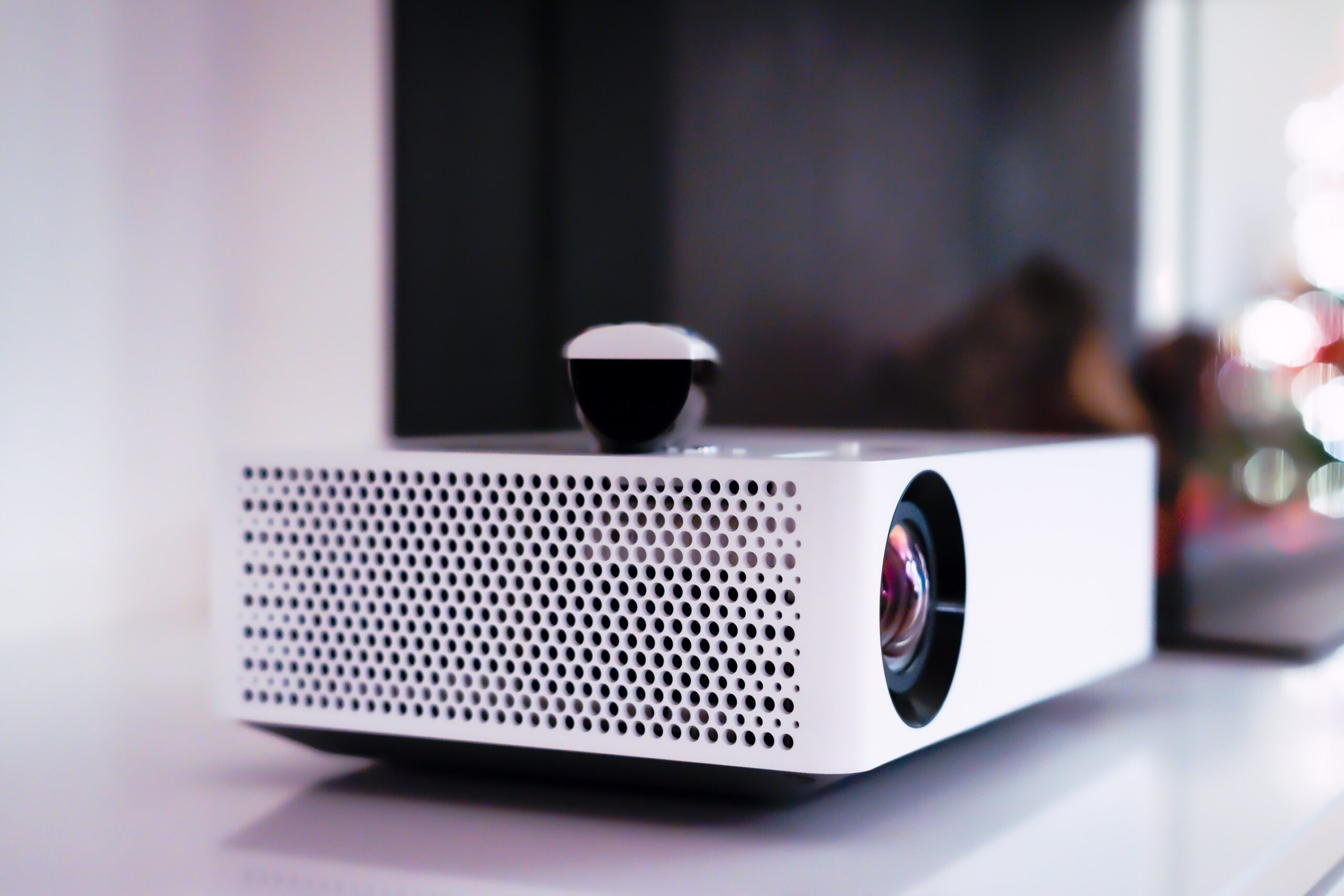Are you looking to enhance your home theater experience with a projector, but unsure whether to go for a 4K or a regular projector? Don’t worry, we’ve got you covered! In this article, we will explore the differences between a 4K home theater projector and a regular projector, and provide you with some helpful tips on how to choose the right one for your entertainment needs. Whether you’re a movie enthusiast or a gaming fanatic, we’ll help you make an informed decision that suits your preferences and budget. So, sit back, relax, and let’s dive into the world of projectors!


Understanding 4K Technology
Definition of 4K
4K, also known as Ultra HD or UHD, refers to a video resolution that has four times the number of pixels as Full HD resolution. It boasts a resolution of 3840 pixels by 2160 pixels, resulting in incredibly sharp and detailed images. With 8.3 million pixels, 4K technology offers a stunning level of clarity that enhances the overall viewing experience.
Difference between 4K and other resolutions
The main difference between 4K and other resolutions, such as Full HD (1080p) and HD (720p), lies in the number of pixels. While Full HD offers a resolution of 1920 pixels by 1080 pixels, 4K provides four times the number of pixels, resulting in a much higher level of detail and realism. Compared to HD, the difference is even more pronounced, with 4K offering an impressive level of clarity that is unparalleled in the world of home theater projectors.
Benefits of 4K resolution
The benefits of 4K resolution are numerous, making it an attractive option for home theater enthusiasts. Firstly, the increased level of detail and clarity enhances the overall viewing experience, allowing you to see every intricate detail in your movies, games, and presentations. Additionally, the higher resolution also means that you can enjoy larger screen sizes without sacrificing picture quality. This is especially important for those who have larger rooms or prefer a more immersive viewing experience. Lastly, 4K resolution future-proofs your setup, as more and more content is being produced in 4K, ensuring that you stay ahead of the curve in terms of technology.
Basics of a Home Theater Projector
Definition of a Home Theater Projector
A home theater projector is a device that projects movies, games, presentations, and other forms of multimedia onto a screen or wall, creating an immersive cinematic experience in the comfort of your own home. It is a popular choice for those who want to recreate the big-screen experience without the need for a large television.
Features of Home Theater Projectors
Home theater projectors offer a range of features that enhance the overall viewing experience. Some common features include high brightness levels, excellent color accuracy, keystone correction, lens shift, and various connectivity options. These features ensure that you can enjoy vibrant and lifelike images, correct distortions caused by projector placement, and easily connect your devices to the projector.
Benefits of Using Home Theater Projectors
There are many benefits to using a home theater projector. Firstly, projectors offer a larger screen size compared to most televisions, allowing for a more immersive and cinematic experience. They also provide versatility in terms of screen size, as you can easily adjust the projection size according to your preference and room size. Additionally, projectors are portable and can be easily moved and set up in different locations, making them flexible for various viewing scenarios. Lastly, projectors often have better picture quality compared to televisions, especially in terms of color accuracy and contrast ratios, resulting in a more captivating viewing experience.
Characteristics of a Regular Projector
Definition of a Regular Projector
A regular projector, also known as a standard or non-4K projector, refers to a projector that does not offer 4K resolution. These projectors typically have a lower resolution, such as Full HD or HD, but still provide a satisfactory viewing experience for various applications.
Features of Regular Projectors
Regular projectors offer a range of features that cater to different needs, albeit without the high resolution of 4K projectors. They often come with good brightness levels, adjustable zoom and focus capabilities, multiple connectivity options, and built-in speakers. While they may not have the same level of detail as 4K projectors, they still provide a decent picture quality for watching movies, playing games, and giving presentations.
Advantages and Limitations of Regular Projectors
Regular projectors have several advantages over 4K projectors. Firstly, they are generally more affordable, making them a viable option for budget-conscious individuals or those who do not require the highest resolution. Regular projectors also tend to have a longer lifespan, as they do not produce as much heat as 4K projectors. However, regular projectors have their limitations. They cannot replicate the same level of detail and clarity as 4K projectors, and the image quality may not be as sharp or vibrant. Additionally, regular projectors may struggle in well-lit environments, as their brightness levels might not be as high as 4K projectors.
Comparing 4K Home Theater Projectors and Regular Projectors
Resolution Differences
The most noticeable difference between 4K home theater projectors and regular projectors is the resolution. 4K projectors offer a resolution of 3840 pixels by 2160 pixels, while regular projectors typically have a lower resolution, such as Full HD (1920 pixels by 1080 pixels) or HD (1280 pixels by 720 pixels). This difference in resolution translates to a significantly higher level of detail and clarity in images displayed by 4K projectors.
Image Quality Differences
Image quality is another area where 4K projectors excel. With their higher resolution, 4K projectors can reproduce more intricate details, resulting in incredibly sharp and lifelike images. Regular projectors may struggle to produce the same level of detail, as their lower resolution limits their ability to display fine details. This difference becomes particularly noticeable when viewing highly textured scenes, landscapes, or close-up shots.
Brightness and Contrast Ratios
4K projectors often boast higher brightness levels and better contrast ratios compared to regular projectors. This means that 4K projectors can deliver brighter and more vibrant images, as well as deeper blacks and brighter whites, resulting in a more visually striking image. Regular projectors, while still capable of producing good image quality, may not have the same level of brightness and contrast, which can impact the overall visual experience, particularly in well-lit environments.
Price Differences
It comes as no surprise that 4K projectors generally come with a higher price tag compared to regular projectors. The advanced technology and increased resolution of 4K projectors contribute to their higher cost. Regular projectors, on the other hand, tend to be more affordable, making them a more accessible option for those on a budget or who do not prioritize the highest resolution.


How to Choose a Projector Based on Room Size
Importance of Room Size
The size of your room plays a crucial role in determining the type of projector that would best suit your needs. A larger room may require a projector with a higher brightness level to compensate for the increased viewing distance, while a smaller room might benefit from a projector with a shorter throw distance.
Projector Recommendations for Small Rooms
For smaller rooms, consider opting for a regular projector with a lower resolution. These projectors are often more affordable and can still provide satisfactory image quality for smaller screen sizes. Look for a projector with good brightness levels and a shorter throw distance to ensure a suitable viewing experience in a confined space.
Projector Recommendations for Large Rooms
In larger rooms, where the viewing distance is increased, a 4K home theater projector would be a better choice. The higher resolution of a 4K projector ensures that you can still enjoy a sharp and detailed image, even from a distance. Additionally, consider a projector with higher brightness levels to compensate for any ambient light in the room.
Choosing a Projector Based on Lighting Conditions
Impact of Lighting on Projector Performance
The lighting conditions in your viewing environment can significantly impact the performance of your projector. Ambient light can wash out the image and reduce visibility, particularly in darker scenes. It is essential to consider the lighting conditions in the room where the projector will be used to ensure optimal image quality.
Best Projectors for Dark Rooms
For dark rooms with minimal ambient light, both 4K home theater projectors and regular projectors can perform well. However, 4K projectors have the advantage of higher brightness levels and better contrast ratios, allowing for a more visually striking image. If you are looking for the ultimate cinematic experience in a dark room, investing in a 4K projector would be the ideal choice.
Best Projectors for Bright Rooms
Rooms with significant ambient light require projectors with high brightness levels to combat the light and ensure a clear and vibrant image. While regular projectors can still perform adequately in bright rooms, 4K projectors with their higher brightness levels and contrast ratios offer a superior viewing experience. Look for projectors with high lumens ratings and excellent color accuracy to ensure visibility and image quality in brighter environments.


Picking a Projector Based on Use Cases
Projectors for Gaming
Gaming enthusiasts may prioritize low input lag and high refresh rates when choosing a projector. Both 4K home theater projectors and regular projectors can be suitable for gaming, depending on the specific requirements. Regular projectors with lower resolution may offer faster response times and better compatibility with gaming consoles. However, 4K projectors provide a more immersive gaming experience with their higher resolution and detailed visuals.
Projectors for Movies
For movie lovers, both 4K home theater projectors and regular projectors can deliver a cinematic experience. However, 4K projectors excel in reproducing the fine details and textures present in movies, ensuring a more captivating viewing experience. With the increasing availability of 4K content, investing in a 4K projector can help future-proof your home theater setup and ensure compatibility with the latest movies and streaming services.
Projectors for Presentations
When it comes to presentations, regular projectors are often the preferred choice. The lower resolution is usually sufficient for displaying slides and graphs, and regular projectors are often more affordable and portable. However, if your presentations involve showcasing high-resolution images or detailed graphics, a 4K home theater projector can enhance the overall impact and clarity of your presentation.
Maintenance and Running Costs
Expected Lifespan of Projectors
The lifespan of a projector can vary depending on multiple factors, including usage, maintenance, and build quality. On average, projectors can last anywhere between 2,000 to 10,000 hours of use. It is important to refer to the manufacturer’s specifications for an estimate of the expected lifespan of a specific projector model.
Replacement Costs for Bulbs
Projectors require bulb replacements at the end of their lifespan. The cost of replacement bulbs can vary depending on the brand and model of the projector. 4K projectors tend to have higher replacement costs for bulbs compared to regular projectors due to their advanced technology. It is advisable to factor in the cost of replacement bulbs when considering the overall investment in a projector.
Energy Consumption Differences
Energy consumption is another aspect to consider when choosing between 4K home theater projectors and regular projectors. Generally, 4K projectors tend to consume more power due to their higher brightness levels and increased performance capabilities. Regular projectors, with their lower resolution and often more basic features, tend to have lower energy consumption. It is important to factor in the long-term energy costs when making a purchase decision.
Typical Additional Features and Accessories
Definition and benefit of Lens Shift
Lens shift refers to the ability of a projector to physically move the lens horizontally or vertically without compromising image quality. This feature is particularly useful when it comes to projector placement and image alignment. By adjusting the lens shift, you can correct keystone and ensure a perfectly rectangular and aligned image, even if the projector is off-center or mounted at an angle.
The role of keystone correction
Keystone correction is a feature that enables the adjustment of the image shape to counteract the trapezoidal distortion caused by the angle between the projector and the screen. It allows you to align the image so that it appears rectangular and undistorted, even if the projector is not perfectly aligned with the screen. Keystone correction is particularly useful in situations where the projector cannot be placed directly in front of the screen.
The use of 3D Glasses
3D glasses provide an immersive three-dimensional viewing experience when used with compatible projectors. They allow for the perception of depth and enhance the realism of movies and games. It is important to ensure compatibility between the projector and the specific type of 3D glasses to ensure optimal performance.
Extra Features like Smart TV capabilities and built-in speakers
Some projectors, particularly 4K home theater projectors, offer additional features such as built-in speakers and Smart TV capabilities. Built-in speakers can be convenient for quick setup and casual viewing, but they may not deliver the same audio quality as dedicated external speakers. Smart TV capabilities allow for streaming content directly from apps like Netflix or Hulu, eliminating the need for additional devices. These extra features can be a valuable addition depending on your specific needs and preferences.
Making a Purchase Decision: 4K Home Theater Projector or Regular Projector?
Weighing Costs Against Features
When making a purchase decision between a 4K home theater projector and a regular projector, it is important to consider both the costs and the features. 4K projectors generally come with a higher price tag due to their advanced technology and superior resolution. However, they offer a more immersive viewing experience and ensure compatibility with the latest content. Regular projectors, on the other hand, are often more affordable and provide satisfactory image quality for various applications. It is crucial to evaluate your budget, the desired image quality, and the future-proofing aspect when weighing costs against features.
Considering Future-proofing Your Purchase
Future-proofing your purchase is an important factor to consider when investing in a projector. The technology landscape is evolving rapidly, and more content is being produced in 4K resolution. By choosing a 4K home theater projector, you can ensure compatibility with the latest movies, games, and streaming services. Regular projectors, while still capable of providing a good viewing experience, may become less optimal as more content is released in higher resolutions.
Importance of Checking Product Reviews and Warranties
Before finalizing your purchase decision, it is crucial to check product reviews and warranties. Product reviews can provide valuable insights from other customers who have already used the projector, helping you make an informed decision. It is important to consider both positive and negative reviews to get a balanced understanding of the projector’s performance. Additionally, checking the warranty provided by the manufacturer ensures that you are protected in case of any defects or issues with the projector, providing peace of mind for your investment.
In conclusion, choosing between a 4K home theater projector and a regular projector depends on several factors such as resolution, room size, lighting conditions, and specific use cases. 4K projectors offer a higher level of detail and clarity, making them ideal for larger rooms and those who prioritize superior image quality. Regular projectors, though not offering the same level of resolution, can still provide a satisfactory viewing experience at a more affordable price. By considering factors such as cost, features, future-proofing, and warranty, you can make an informed and personalized decision that best suits your needs and preferences.

